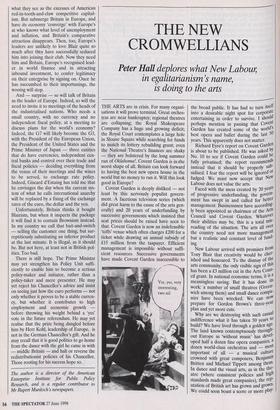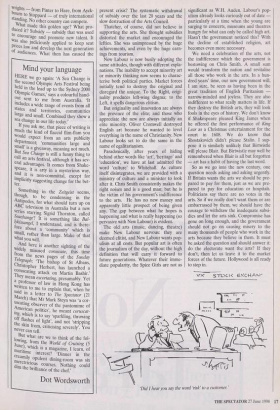THE NEW CROMWELLIANS
Peter Hall deplores what New Labour,
in egalitarianism's name, is doing to the arts
THE ARTS are in crisis. For many organi- sations it will prove terminal. Great orches- tras are near bankruptcy; regional theatres are collapsing; the Royal Shakespeare Company has a huge and growing deficit; the Royal Court contemplates a large hole in Sloane Square while searching for funds to match its lottery rebuilding grant; even the National Theatre's finances are shaky — they are bolstered by the long summer run of Oklahomal. Covent Garden is in the worst shape of all. Britain can look forward to having the best new opera house in the world but no money to run it. Will this look good in Europe?
Covent Garden is deeply disliked — not least by this nervously populist govern- ment. A facetious television series (which did great harm to the cause of the arts gen- erally) and 20 years of underfunding by successive governments which insisted that seat prices should be raised have seen to that. Covent Garden is now an indefensible `toffs' venue which often charges £200 for a ticket while drawing an annual subsidy of £15 million from the taxpayer. Efficient management is impossible without suffi- cient resources. Successive governments have made Covent Garden inaccessible to the .broad public. It has had to turn itself into a desirable night spot for corporate entertaining in order to survive. I should perhaps mention in passing that Covent Garden has created some of the world's best opera and ballet during the last 50 years. This apparently does not matter. Richard Eyre's report on Covent Garden is about to be published. He was asked by No. 10 to see if Covent Garden could be fully privatised; the report recommends instead that it should be properly sub- sidised. I fear the report will be ignored or fudged. We must now accept that New Labour does not value the arts.
Faced with the mess created by 20 years of progressive underfunding, the govern- ment has swept in and called for better management. Businessmen have according- ly been appointed as chairmen of the Arts Council and Covent Garden. Whatever their abilities may be, this is a total nits' reading of the situation. The arts all over the country need not more management but a realistic and constant level of flaw- ing.
New Labour arrived with promises from Tony Blair that creativity would be eiler- ished and honoured. To the dismay of the arts community, the only visible sign of this has been a £3 million cut in the Arts Coa' cil grant. In national economic terms, it is a meaningless saving. But it has done its work: a number of small theatres (Green- wich among them) and small dance comPa" vies have been wrecked. We can now prepare for Gordon Brown's three-year plan and yet more cuts. Why are we destroying with such casual indifference what it has taken 50 years to build? We have lived through a golden age. The land known contemptuously through- out Europe as 'without music' has devel- oped half a dozen fine opera companies, a dozen world-class orchestras and — most important of all — a musical culture crowned with great composers, Benjaroih Britten and Michael Tippett among their!' In dance and the visual arts, as in the the" atre (where consistent policies and high standards made great companies), the rep' utation of British art has grown and grown. We could soon boast a score or more play' wrights — from Pinter to Hare, from Ayck- bourn to Stoppard — of truly international standing. No other country can compete. What made this golden age? What pro- duced it? Subsidy — subsidy that was used to encourage and promote new talent. It was also judiciously applied to keep seat prices low and develop the next generation of audiences. What then has caused the present crisis? The systematic withdrawal of subsidy over the last 20 years and the slow destruction of the Arts Council.
Thatcher, of course, did not believe in supporting the arts. She thought subsidies distorted the market and encouraged the lefties. She was unimpressed by the huge achievements, and even by the huge earn- ings from tourism. New Labour is now busily adopting the same attitudes, though with different expla- nations. The inability to accept minority art or minority thinking now seems to charac- terise both political parties. Market forces initially tend to destroy the original and disregard the unique. To the Right, origi- nality produces left-wing dogma; to the Left, it spells dangerous elitism. But originality and innovation are always the province of the elite; and those who appreciate the new are always initially an elite minority. Oliver Cromwell destroyed English art because he wanted to level everything in the name of Christianity. New Labour looks set to do the same in the name of egalitarianism. Paradoxically, after years of hiding behind other words like 'art', 'heritage' and `education', we have at last admitted the word 'culture' to Whitehall. As culture itself disintegrates, we are provided with a ministry of culture and a minister to look after it. Chris Smith consistently makes the right noises and is a good man; but he is the victim of his government's indifference to the arts. He has no new money and apparently little prospect of being given any. The gap between what he hopes is happening and what is really happening (so pervasive with New Labour) is evident. The old arts (music, dancing, theatre) make New Labour nervous: they are deemed elitist, and New Labour wants pop- ulism at all costs. But popular art is often the journalism of the day, without the high definition that will carry it forward to future generations. Whatever their imme- diate popularity, the Spice Girls are not as significant as W.H. Auden. Labour's pop- ulism already looks curiously out of date particularly at a time when the young are surging to concerts, museums and theatres hungry for what can only be called high art. Hasn't the government noticed this? With the decline of established religion, art becomes even more necessary.
We need a celebration of the arts, not the indifference which the government is bestowing on Chris Smith. A small sum would transform the nation and revitalise all those who work in the arts. In a hun- dred years' time, our new government will, I am sure, be seen as having been in the great tradition of English Puritanism narrow-minded and joyless. They are also indifferent to what really matters in life. If they destroy the British arts, they will look fools in the eyes of history. We don't know if Shakespeare pleased King James when he offered the first performance of King Lear as a Christmas entertainment for the court in 1608. We do know that Shostakovich didn't please Stalin. I sup- pose it is similarly unlikely that Birtwistle will please Blair. But Birtwistle may well be remembered when Blair is all but forgotten — art has a habit of having the last word.
So as we go into the new century, one question needs asking and asking urgently. If Britain wants the arts we should be pre- pared to pay for them, just as we are pre- pared to pay for education or hospitals. Politicians say there are no votes in the arts. So if we really don't want them or are embarrassed by them, we should have the courage to withdraw the inadequate subsi- dies and let the arts sink. Compromise has gone on long enough, and the government should not go on causing misery to the many thousands of people who work in the arts because they believe in them. It must be asked the question and should answer it: do the electorate want the arts? If they don't, then let us leave it to the market forces of the future. Hollywood is all ready to step in.
Did I hear you say the word 'risk' to a customer.'



























































 Previous page
Previous page